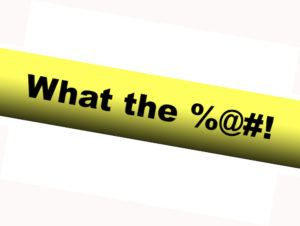
A visit to an elementary school opened my eyes to something that would never have happened a few years ago at a “good” school.
Profanity from the children. This R-rated classroom wouldn’t have been allowed even a PG-13 rating.
I’m amazed as a classroom observer how the children act as if I’m invisible. The children quickly and correctly surmise that I’m not a teacher or a parent and therefore have no authority over their behavior. When the second-grade boys thought no one was looking in the hallways to the bathrooms, or the blocked alcove of the classroom, inappropriate behavior erupted in words and gestures that I’m sure parents and grandparents would be appalled to witness.
Profanity in children is a sign of two basic things:
- A call for leadership to the adults in the child’s world of home and school, and/or
- An inability on the part of the children to express their emotions, needs and desires.
What do leaders do?
Leaders develop people, empower others to do the right things, give clear and true direction for growth and learning, and use principles and ethics to guide. When our children use profanity, it should indicate to us that they have lost a key connection to trust in the adults in their world. We need to step back and consider the situation and determine if we have been leading or managing. When we are too concerned with managing by taking care of things instead of people, controlling things and people, and controlling outcomes without regards to people, our leadership stumbles.
Profanity is also a sign of limited skills, vocabulary being on top of the list.
Can’t express frustration? Perhaps a word beginning with “f” is used.
Can’t express your desires or needs to the adults around you? Perhaps curse words provide the edginess that makes adults take notice, and if not, start to escalate the profanity user as a leader in a leaderless group.
We need to step up to the leadership challenge for our children by providing them effective and appropriate ways to express their emotions, needs and desires. Many adults can only express four feelings: mad, sad, glad and bad.
Let’s help our children learn the emotional vocabulary necessary to navigate their way through life. Here is a list of words from 200 Ways to Raise a Boy’s Emotional Intelligence by Will Glennon that can help our children learn to express their emotions, needs and desires in ways other than profanity.
Safe, relaxed, satisfied, undesirable, lethargic, needy, confident, optimistic, loved, insulted, resentful, ignored, excited, energized, connected, empty, trapped, obligated, mused, fortunate, effective, rotten, infuriated, idiotic, empowered, spirited, peaceful, puzzled, resigned, terrified, special, wonderful, vibrant, regretful, intolerant, gullible, respected, fantastic, elated, hesitant, horrible, hated, eater, excellent, engaged, indifferent, inept, invisible, tremendous, tipsy, tingly, lonely, lousy, lost, forgiven, funny, fearless, grumpy, guilty, gullible, enthusiastic, enriched and empathetic.
Let’s step up to the challenge of providing clear and true leadership for our children, in word, thought and deed.
It would be a %*#@ shame not to.
